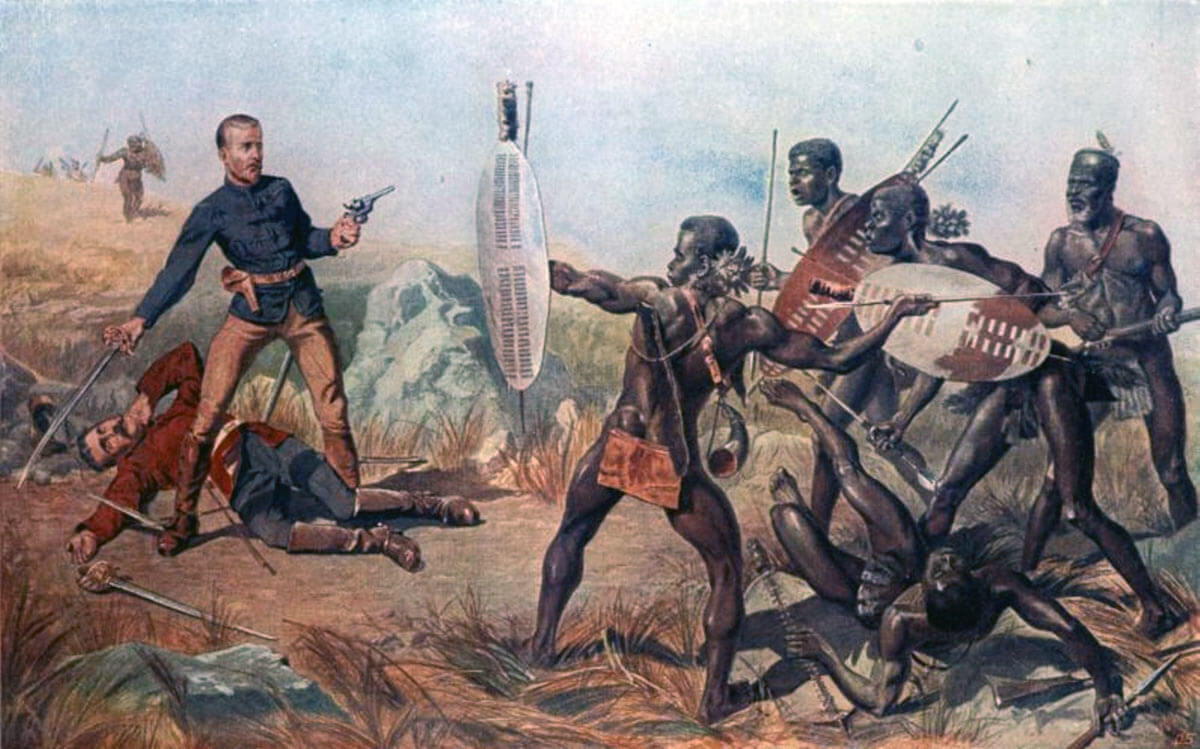1879
British forces of South Africa’s Natal colony comprised of 18,000 soldiers and civilian volunteers invade Zululand. Zulu King Cetshwayo has sought to avoid war, but when attacked his forces successfully push back the invaders.


British forces of South Africa’s Natal colony comprised of 18,000 soldiers and civilian volunteers invade Zululand. Zulu King Cetshwayo has sought to avoid war, but when attacked his forces successfully push back the invaders.

Under military pressure, Portugal agrees to the British Ultimatum of 1890 that requires surrendering claims to areas west of Lake Malawi and south of the Ruo River. Portugal laid claim in the 1830s to large sections of Central Africa because some Portuguese traders had entered these areas, even though they were never occupied or developed. Britain wants to develop the Chinde Canal in the Zambezi River delta, which has been discovered to be deep enough to permit international shipping and can open up the interior of Nyasaland. (pic: the paddle-wheel steamship Mosquito on the Zambezi River)

The Herero people of Namibia declare war on German occupiers of their land, who have brought ruinous taxes and repressive measures. The rebellion will be put down in months, as Germany pursues a policy of genocide against the Herero and Nama people.

For the first time, an automobile makes the trip from Nairobi to Mombasa, in British Kenya. A Riley motorcar is driven by Lionel Douglas Galton-Fenzi, the founder in 1919 of the East African Automobile Association. He and his co-driver have to clear bush with machetes and carry all their own petrol.

The Nigerian town of Igede-Ekiti hosts the Western Region's first Westernised White Wedding. The newlyweds are Mr. and Mrs. John Oke Agbede.

The Massacre at Sidi-Haman, a village 30km south of Algiers, Algeria, is carried out by 50 gunmen from the Armed Islamic Group of Algeria. They massacre up to 400 people, including children; invading homes, and bombing a mosque café where a film is being shown.

The quasi-state of Maakhir, which established itself in 2007, is reincorporated into the Sanaag region that is controlled by Somaliland and Puntland, which are autonomous states within the Somalia Federation.

Operation Cerval begins in northern Mali to implement U.N. Resolution 2018 designed to provide security to Mali’s interim government. French forces begin to expel the Islamic terrorist group Ansar Dine from areas it has occupied for one year.

Central African Republic’s Transitional Council working to restore order and democracy following civil war elects as the country's interim president, Catherine Samba-Panza. She is the first woman to run the country.

Rolling out one of the world’s longest red carpets, the Sir Dawda Kairaba Jawara International Conference Center opens in The Gambia. The 14,000m² facility has outraged conservationists because it was built in the Bijilo Forest Park that draws tourists to see the endangered West red colobus money.


South African writer and political activist, in Pietermaritzburg, Natal Colony, South Africa. His classic 1948 novel Cry the Beloved Country drew international attention to South Africa. He opposed the apartheid government’s policies of black oppression by founding the Liberal Party in 1953, the same year his globally popular novel Too Late the Phalarope was published.

Kenyan champion runner, in Mombasa, Kenya. He was the first African to win the 400m hurdles, his specialty, when he ran at the Commonwealth Games, in 1978. After winning back to back Continental championships in hurdles, in 1978 and 1979, he was part of the 4 x 400 relay team that won Kenya’s first title in the event, at the 1979 African Championships in Athletics.

Nigerian writer, in Warri, Delta State, Nigeria. Writing in all fields – novels, plays, poems, children’s stories, short stories, movie and radio scripts, he has authored more than 40 books. The common thread in all these works is how truth and justice are required to address societal ills.